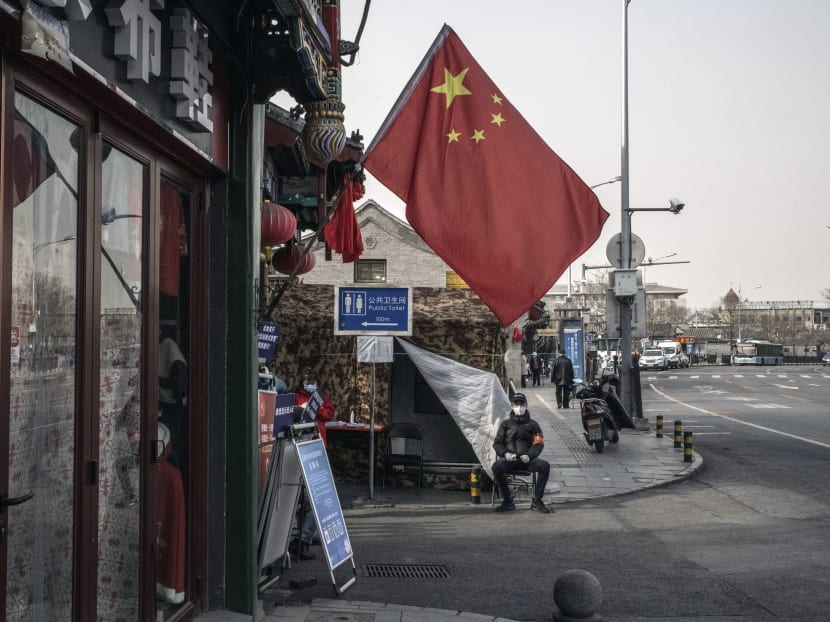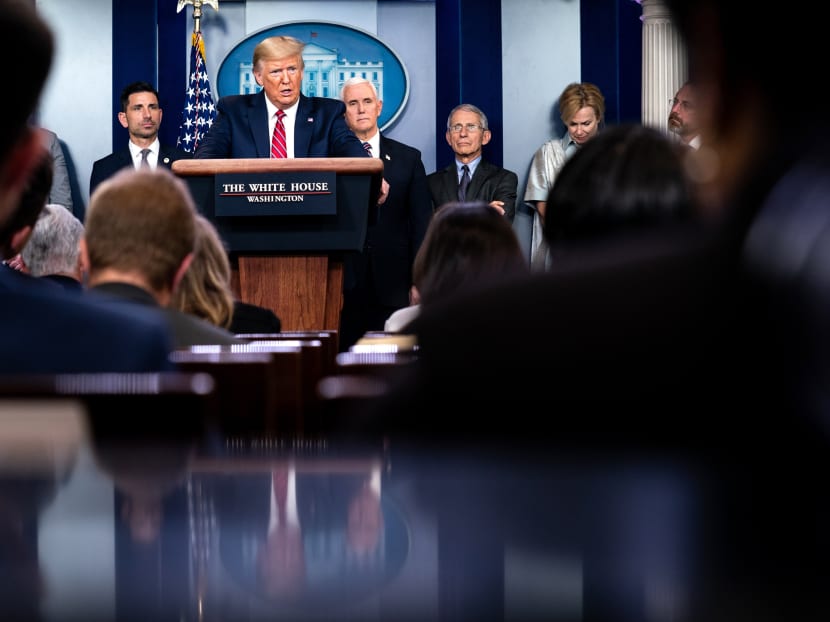As the world fights Covid-19, China bashing hurts everybody
When 2020 began, eerily shadowing the coronavirus epidemic in Wuhan was a global outbreak of conspiracy theories. The World Health Organization (WHO) termed this an “infodemic” that “spreads faster and more easily than this virus, and is just as dangerous”. But the WHO’s warning was ignored by non-scientific, China-bashing commentators.

A guard on March 18, 2020, at the entrance of a checkpoint in Beijing where neighborhood residents must show they are healthy.
When 2020 began, eerily shadowing the coronavirus epidemic in Wuhan was a global outbreak of conspiracy theories.
The World Health Organization (WHO) termed this an “infodemic” that “spreads faster and more easily than this virus, and is just as dangerous”. But the WHO’s warning was ignored by non-scientific, China-bashing commentators.
Several American politicians, such as Senator Tom Cotton, suggested that the coronavirus is a bioweapon leaked from the Wuhan Institute of Virology.
On Feb 19, 27 public health scientists from the United States, Europe, and Asia wrote in The Lancet medical journal: “We stand together to strongly condemn conspiracy theories suggesting that Covid-19 does not have a natural origin.”
They affirmed: “Conspiracy theories do nothing but create fear, rumours, and prejudice that jeopardise our global collaboration in the fight against this virus.” But they, too, were ignored.
The “Chinese bioweapon” rumour, first posted on Twitter, was translated into Chinese and injected into the heart of Chinese social media, exporting the infodemic there.
On Feb 20, the Wuhan Institute of Virology declared that such rumours had severely disrupted its anti-coronavirus emergency efforts. This was the very lab that sequenced the coronavirus on Jan 2 before submitting the virus’ genome to the WHO on Jan 11.
In humanity’s collective fight against the coronavirus, to be anti-Chinese, anti-American, or anti-any-nationality is to be anti-humanitarian.
For example, Mr Cotton’s own state of Alabama descended into panic as his “Chinese bioweapon” rumour, alongside many others, underwent community spread.
VIRUSES KNOW NO IDEOLOGY
A nation’s ability to contain the coronavirus depends on numerous factors: Climate, demographics, location, wealth, leadership, medical stockpiles, healthcare system, and so on.
But non-scientific, China-bashing columnists fixate on China’s “authoritarianism”, as though a nation’s ability to fight viruses depends entirely on whether it holds elections.
For example, Western news reports unanimously portray Wuhan’s lockdown as “draconian” and “undemocratic”, as though there is no possibility of their own countries needing the same measures.
In other words, the old narrative of the “despotic Orient” was resurrected, alongside the image of Asians as unsanitary and backward people.
These impressions harm not just Asia but also the West. They produce the powerful illusion that the coronavirus is an exclusively “Chinese” and “authoritarian” problem.
Thus, even as deaths in China were reported throughout January and February, Western columnists and netizens behaved as if democracies are immune to viruses.
As late as Feb 28, the WHO-China Joint Mission on Covid-19 warned that much of the world is not ready to “implement the measures that have been employed to contain Covid-19 in China”, which are “the only measures that are currently proven to interrupt or minimise transmission chains in humans”.
However, no Western nation entertained the idea of learning from the despotic Orient.
Equally ignored were the Joint Mission’s findings: “In the face of a previously unknown virus, China has rolled out perhaps the most ambitious, agile and aggressive disease containment effort in history.”
In China, the voices of health experts were initially drowned out by the government. But in the West, the voices of health experts are still drowned out by China bashing.
For example, the scientists from the earlier-mentioned Lancet article stressed: “The scientists, public health professionals, and medical professionals of China, in particular, have worked diligently and effectively to rapidly identify the pathogen behind this outbreak, put in place significant measures to reduce its impact, and share their results transparently with the global health community.”
Such voices simply have little traction in a Western media landscape marked by China bashing. Why is this so?
For one thing, it is convenient to take a simple, black-and-white view of a complex and stressful world.
Foreigners, especially the Chinese, are a convenient target if you need somebody to blame for your country’s problems. Thus, terms such as “the Chinese virus” arise, used by none other than US President Donald Trump.
As United Nations special rapporteur E. Tendayi Achiume pointed out on March 23, such "calculated use of a geographic-based name for this virus is rooted in and fosters racism and xenophobia".

Mr Trump, speaking about his administration's response to the coronavirus pandemic on March 20, 2020, has repeatedly called the coronavirus the “Chinese virus" until recently. Photo: The New York Times
CRITICISM OF CHINA
Rather than call for a united front against the coronavirus, Western columnists initially forced the spotlight on Wuhan doctor Li Wenliang.
He had warned fellow doctors on Dec 30, 2019 about a possible new virus, but was detained by police on Jan 3 and accused of rumour-mongering.
However, earlier on Dec 27, four unusual cases of pneumonia were already reported to the Wuhan Centre for Diseases Prevention and Control (CDC).
On Dec 30, active case finding began in Wuhan. On Dec 31, the China CDC and WHO were informed about the new SARS-like virus. This led to the swift identification of the novel coronavirus on Jan 7.
Thus, the silencing of Dr Li on Jan 3 was a botched effort to stem rumour-mongering and mass panic whilst investigations about the unknown virus were underway. Dr Li’s raising of the alarm, while heroic and right, would have resulted in little substantive change.
Alas, the West’s impassioned support for Dr Li scarcely exists for the rest of China’s medical heroes, because these individuals do not fit into a China-bashing narrative.
Of course, China is far from blameless. In mid-March, it baselessly accused the US Army for bringing the coronavirus to Wuhan in October 2019.
This is no better than commentators who started the “Chinese bioweapon” infodemic.
Also, the first coronavirus patients were identified on Dec 8, but China only reported the outbreak to the WHO three weeks later, on Dec 31.
Even China’s top leaders admitted on Feb 3 “shortcomings and difficulties exposed in the response to the epidemic”.
A March 3 study by the University of Southampton estimated that, had non-pharmaceutical interventions (“NPIs”, such as early detection and isolation of cases) been implemented “one week, two weeks, or three weeks earlier in China, cases could have been reduced by 66 per cent, 86 per cent, and 95 per cent, respectively”.
But China-bashing columnists often ignore the study’s broader point: Without China’s subsequent interventions, infected cases “would likely have shown a 67-fold increase”.
The study stresses: “Our results highlight that countries facing potential spread of Covid-19 should consider proactively planning NPIs and relevant resources for containment.”
Regrettably, many Western columnists and politicians ignored this call to action but simplistically used the study as China-bashing ammunition.
If ideologies must stay, let them be humanitarian ones.
At the level of nations, humanitarianism is when medical supplies and volunteers are flown into countries dealing with death and despair. It is when citizens of the world resolve to help each other as a single human race.
At the level of communities, humanitarianism is when masks and goods are not hoarded, so that those who need them more can have them. It is when individuals volunteer to deliver food and other necessities to homeless or self-quarantining members of their community.
And if cherished loved ones must die, let them be anti-humanitarian ideologies.
ABOUT THE AUTHOR:
Ashton Ng is a Singaporean PhD candidate in Chinese History and Kuok Family–Lee Kuan Yew Scholar at the University of Cambridge.









